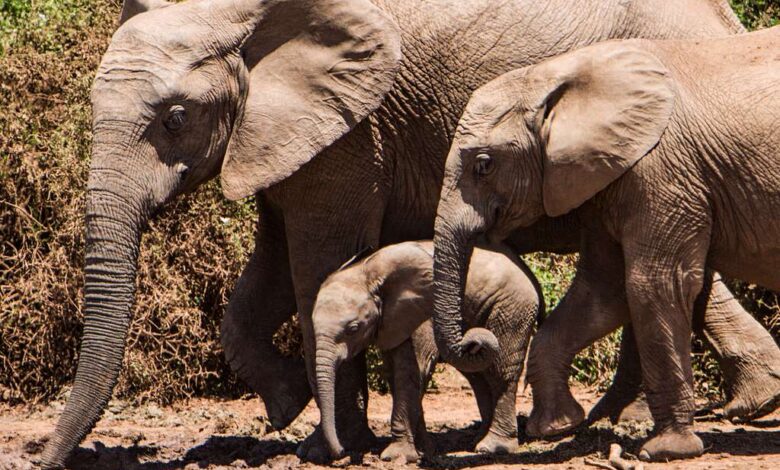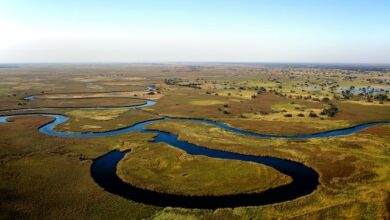Discover the Wonders of Addo Elephant National Park
A Guide to South Africa's Wildlife Haven

If you’re looking for a breathtaking wildlife experience, look no further than Addo Elephant National Park.
Nestled in the Eastern Cape of South Africa, this park is a sanctuary for elephants and a treasure trove of biodiversity.
With its stunning landscapes, rich history, and abundant wildlife, Addo offers visitors an unforgettable adventure.
Let’s dive into everything you need to know about this incredible destination!
A Brief History of Addo Elephant National Park
Addo Elephant National Park was established in 1931 to protect the last remaining elephants in the area. At that time, only 11 elephants were left due to extensive hunting and habitat loss.
Thanks to conservation efforts, the park now boasts over 600 elephants and has expanded to become the third-largest national park in South Africa.
Also Read: Things to do in Cape Town, South Africa
Early Inhabitants: The region was once home to the Khoisan people, who lived off the land and hunted the abundant wildlife.
Unfortunately, they faced devastating losses due to disease and conflict in the 1700s.
Conservation Milestones: The park’s original area was just over 2,000 hectares.
Over the years, it has grown significantly, now encompassing various ecosystems and wildlife species, including the Big Seven: elephants, lions, leopards, buffaloes, rhinoceroses, southern right whales, and great white sharks.
Also Read: Rift Valley Lakes From Naivasha to Nakuru
Exploring the Diverse Ecosystems
Addo Elephant National Park is unique in that it features five of South Africa’s seven major vegetation zones.
This diversity creates a rich habitat for wildlife and offers visitors a variety of landscapes to explore.
Savanna and Thicket: The park’s savanna and thicket areas are home to elephants, lions, and a variety of antelope species. The dense thickets provide cover for shy animals like the black rhinoceros.
Marine Protected Area: The park also includes a marine reserve, offering opportunities to see marine life, including dolphins, seals, and the majestic southern right whale during migration seasons.
Wildlife Encounters: The Big Seven and Beyond
When you think of Addo, elephants are likely the first animals that come to mind. However, the park is teeming with wildlife.
The Big Seven:
- Elephants: The park is famous for its large herds, often seen near waterholes.
- Lions: These majestic predators roam the park, offering thrilling sightings.
- Leopards: Though elusive, leopards can occasionally be spotted in the trees.
- Rhinoceroses: Both black and white rhinos call Addo home, with conservation efforts helping their populations recover.
- Buffaloes: Large herds of Cape buffalo can be seen grazing in the park.
- Whales: Southern right whales can be spotted off the coast during migration.
- Great White Sharks: The marine reserve is home to these apex predators, making Addo a unique destination for shark enthusiasts.
- Other Notable Species: In addition to the Big Seven, visitors can encounter zebras, giraffes, hippos, and a variety of antelope species, including kudu and eland.
Activities and Experiences in Addo
Addo Elephant National Park offers a plethora of activities for every type of traveller. Whether you’re seeking adventure or relaxation, there’s something for everyone.
Game Drives: Experience the thrill of spotting wildlife on guided game drives. Knowledgeable rangers will take you to the best viewing spots, ensuring you don’t miss a thing.
Night Drives: For a different perspective, join a night drive to see the park come alive with nocturnal animals. Spotlights illuminate the landscape, revealing creatures that are rarely seen during the day.
Hiking Trails: Explore the park on foot with various hiking trails. The Alexandria Hiking Trail offers stunning views and a chance to connect with nature.
Birdwatching: With over 400 bird species, Addo is a birdwatcher’s paradise. Look for the endangered black eagle and the vibrant lilac-breasted roller.
Beach Access: The park’s proximity to the coast allows visitors to enjoy beach activities, including swimming and fishing.
Also Read: The Beauty of Sossusvlei Namibia’s Desert Gem
Accommodation Options for Every Budget
Addo Elephant National Park provides a range of accommodation options to suit different preferences and budgets.
Rest Camps: The park features several rest camps, including Addo Rest Camp, Matyholweni Rest Camp, and Narina Bush Camp. These camps offer comfortable lodging and easy access to park activities.
Luxury Lodges: For those seeking a more upscale experience, private lodges within and around the park provide luxurious accommodations and personalized service.
Camping: Adventurers can opt for camping within the park, immersing themselves in the natural surroundings.
Conservation Efforts and Community Involvement
Addo Elephant National Park is not just about wildlife; it’s also about community and conservation.
The park works closely with local communities to promote sustainable tourism and conservation practices.
Community Engagement: Local residents benefit from job opportunities and training in hospitality and conservation, fostering a sense of pride and ownership in the park.
Conservation Initiatives: Ongoing efforts focus on protecting endangered species and preserving the park’s unique ecosystems. The park has implemented innovative technologies, such as AI collars for rhinos, to enhance their safety.
Conclusion
Your Next Adventure Awaits at Addo Elephant National Park
Addo Elephant National Park is a remarkable destination that combines stunning landscapes, diverse wildlife, and a commitment to conservation.
Whether you’re a seasoned traveller or a first-time visitor, the park offers an array of experiences that will leave you with lasting memories.
So pack your bags, grab your camera, and get ready for an adventure in one of South Africa’s most iconic national parks!
FAQs About Addo Elephant National Park
What is the best time to visit Addo Elephant National Park?
The best time to visit is during the dry season (May to September), when animals congregate around waterholes, making wildlife sightings more frequent.
Can I self-drive in the park?
Yes, self-driving is allowed, but guided game drives are recommended for the best wildlife experiences and insights.
Are there any dangerous animals in Addo?
Yes, while the park is safe for visitors, it is home to potentially dangerous animals like elephants and lions. Always follow park guidelines.
What should I pack for my visit?
Bring comfortable clothing, binoculars for wildlife viewing, a camera, sunscreen, and insect repellent.
Is Addo Elephant National Park suitable for families?
Absolutely! The park offers family-friendly activities and accommodations, making it a great destination for all ages.
Are there guided tours available?
Yes, the park offers various guided tours, including game drives and hiking excursions led by knowledgeable rangers.
Can I see whales from the park?
Yes, during the migration season (June to November), southern right whales can be spotted off the coast near the park.
For more information, visit here.





